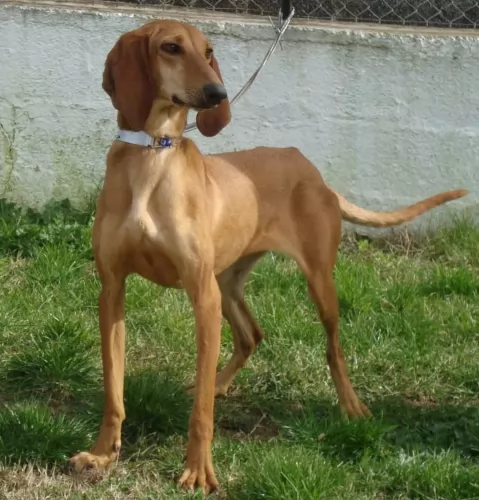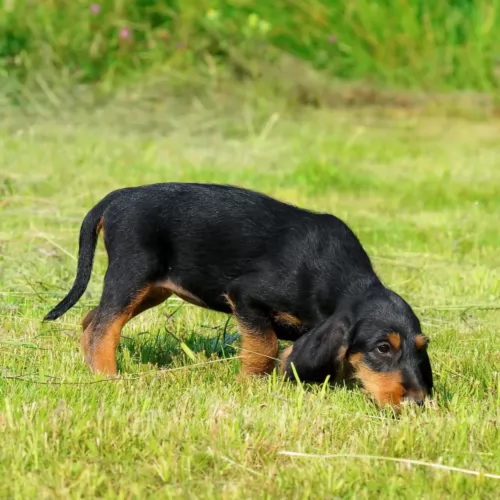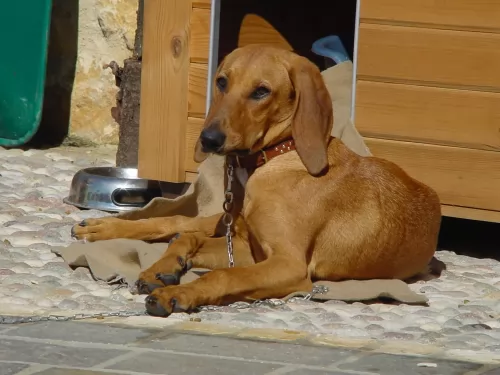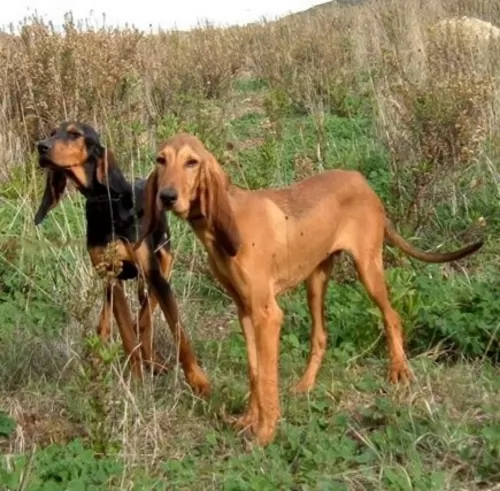 Petzlover
PetzloverKuri is originated from French Polynesia but Segugio Italiano is originated from Italy. Kuri may grow 30 cm / 11 inches shorter than Segugio Italiano. Kuri may weigh 12 kg / 26 pounds lesser than Segugio Italiano. Both Kuri and Segugio Italiano has same life span. Both Kuri and Segugio Italiano has almost same litter size. Both Kuri and Segugio Italiano requires Low Maintenance.
Kurī, also known as Guri or Peroor New Zealand Native Dog, is the Maori name for this dog which was introduced to New Zealand by the Maoris when they migrated from East Polynesia around 1280 AD.
They were in fact Polynesian dogs which died out in New Zealand. The Māoris would use the dog as a food source and the skins would be used to make some form of clothing. The bones were used to make items such as necklaces and fish hooks.
Not surprising then that the dog became extinct in New Zealand, with the last known Kuri specimens being found in the Museum of New Zealand Te Papa Tongarewa.
 Known also as the Segit, the Segugio Italiano is an ancient dog breed believed to have descended from Egyptian hounds.
Known also as the Segit, the Segugio Italiano is an ancient dog breed believed to have descended from Egyptian hounds.
Both males and females stand at between 48 and 58cm and they weight between between 18 and 28kg. It’s a medium to large sized dog. The dog is a scenthound and was at first used for wild boar hunting in ancient times. Once wild boar numbers become much less, the Segit itself dropped in numbers, and it faced extinction.
Dedicated houndsmen worked hard to restore the numbers and the dog was successfully bred. It is a popular dog in Italy today. The Segugio Italiano isn’t recognized by the American Kennel Club whereas the Kennel Club in the UK recognizes it in the Hound Group.
The Kuri is extinct now but it was a small to medium sized dog with a thick set neck. He stood between 25 and 46cm and weighed about 13 to 15 kilograms.
He had thick medium-length rough textured hair, small head, erect ears, short legs and a bushy tail. The color of their weatherproof coats varied and some were black, some white or cream and some were a mix of colors and patterns.
An interesting feature about them is that they didn’t bark but instead they howled. They were good at hunting birds.
The Kuri wasn’t considered the brightest breed, but he would have benefited from some training and socialization as this just makes a dog a better pet in every sense – more obedient and better behaved in all situations.
Some Kuris were friendly and able to bond with their human owners, while others were independent and somewhat aloof. Their size would have allowed them to be kept in the city or the country as they weren’t particularly energetic dogs, not requiring much ground to run around in.
 The Segugio Italiano has a distinctive look to him. He’s a large dog standing at between 68 and 76cm in height and weighing between 16 and 27 kg.
The Segugio Italiano has a distinctive look to him. He’s a large dog standing at between 68 and 76cm in height and weighing between 16 and 27 kg.
The body is lean and muscular and the Italian Scenthound has an amicable looking expression on his face. The coat of the dog is available in two types - short-haired or wire-haired.
The short-haired variety needs to be brushed on a weekly basis but is generally easy to maintain. Wire-haired dogs may require hand-stripping several times a year.
The coat of these dogs range from deep red to wheaten or black. Many dogs have white markings on the head, chest, feet, and the tip of the tail. The ears are long and floppy. If you want your dogs to have puppies, you can expect a litter size of between 4 to 6 puppies.
As a Scenthound, the Segugio Italiano is an intelligent dog, easily trained. He is best trained and socialized as he tends to be stubborn and he is also an independent strong-willed dog. It’s not an aggressive dog and yet it makes a good watchdog.
He’s adaptable but wouldn’t adjust well to living in a small space in the city.
It appears as though some Kuris were kept as pets and that they were able to develop loving relationships with their owners.
We don’t know too much about the extinct Kuri, but scientists are now studying and analyzing the hairs of the dog to find out more about it, and specifically why the Maori dog disappeared some time in the 19th century without a trace.
They will also be analyzing Kuri bones salvaged by archaeologists and which were found on rubbish heaps. These bones can be tested to see whether the diet of the Kuri changed much between the days of Maori settlements and the arrival of the European settlers.
 The amicable Segugio Italiano just wants to please. They get on well with children and pets. They’re easy going dogs that will require a good deal of exercise.
The amicable Segugio Italiano just wants to please. They get on well with children and pets. They’re easy going dogs that will require a good deal of exercise.
They make wonderful pets and companions, being particularly well suited to outdoor type of people. They make good watchdogs too, and with his interesting looks, his intelligence and gentle nature, you’re going to have an exceptional canine companion.
Some Kuri dogs scavenged while others were pets and ate well. The lifestyle they led would have determined their health. In those days they would have suffered with dental disease, common in adult dogs. Left untreated, dental disease can lead to dental tartar buildup with gum inflammation and tooth loss.
Dental disease can also lead to other organ diseases. These days brushing your dog’s teeth with canine toothpaste and toothbrush can help to ward off dental disease.
Those Kuris that weren’t pets, tried to survive scavenging, and their homeless situation could well have led to ear infections – caused from a wax- and dirt buildup within the ear. He would have been frantic trying to scratch his ears. In modern times, if your dog showed signs of an ear infection, you would need to get him to the vet.
 When you have a Segugio Italiano, you’re not likely to be spending much money at the vet, as these dogs are fairly healthy.
When you have a Segugio Italiano, you’re not likely to be spending much money at the vet, as these dogs are fairly healthy.
If your pet does show signs of illness, as a responsible pet owner it is your job to get him pet to the vet quickly as this can prevent other problems developing.
Dogs with such long ears can be more prone to ear infections. Your pet can be in pain and he will shake his head and paw at the infected ear. He may also be vomiting from nausea. You need to get your dog to the vet as soon as possible because with severe ear infection cases, there can even be facial nerve damage.
The Kuri will have required regular grooming which means a brushing down twice a week. Brushing would have been useful to prevent loose hairs from shedding with the dog. He would have had to have his ears and eyes checked too to avoid infections. Brushing him would have given his owner the chance to check him over for fleas and ticks too.
As the Kuri wasn’t an overly energetic dog, a walk a day would have kept him content and fit.
The Kuri was a dog that essentially formed part of someone else’s diet. Those that managed to escape being a meal for someone no doubt had to scavenge for food. Because they were used to help people catch birds, they themselves were used to catching birds for themselves.
As a small to medium sized dog, if you were to keep such a dog as a pet you would have given him a cup or two of dried kibble a day and tried to vary his diet by including some home-cooked food and raw meat.
 The Segugio Italiano comes with two coat types, the short-haired variety as well as the wire-haired variety. The short-haired dog will need to be brushed at least twice a week, while the wire-haired dog may require hand stripping.
The Segugio Italiano comes with two coat types, the short-haired variety as well as the wire-haired variety. The short-haired dog will need to be brushed at least twice a week, while the wire-haired dog may require hand stripping.
Segugio Italianos love a good bout of exercise, and out on the hunt they are constantly on the move. They’re known for their stamina, but once back at home, they can settle down quite calmly. Make sure this pet of yours is well exercised, whether walks, running off his leash or ball games.
Have a good look at the size of your dog, his age and energy levels before choosing dog food. When feeding your dog, don’t make it all complicated. All your dog wants is a simple, nutritious meal.
There are good commercially manufactured dog foods on the market and by reading the labeling you can ensure the best kibble for your pet. Try and give him some home made food too.
Boiled chicken, brown rice or pasta and spinach, sweet potatoes and carrots are a healthy choice for your pet – simple, tasty and nutritious. You can add a little bit of this twice a week to the dry kibble. Your dog will love it and it won’t cause any digestive problems.